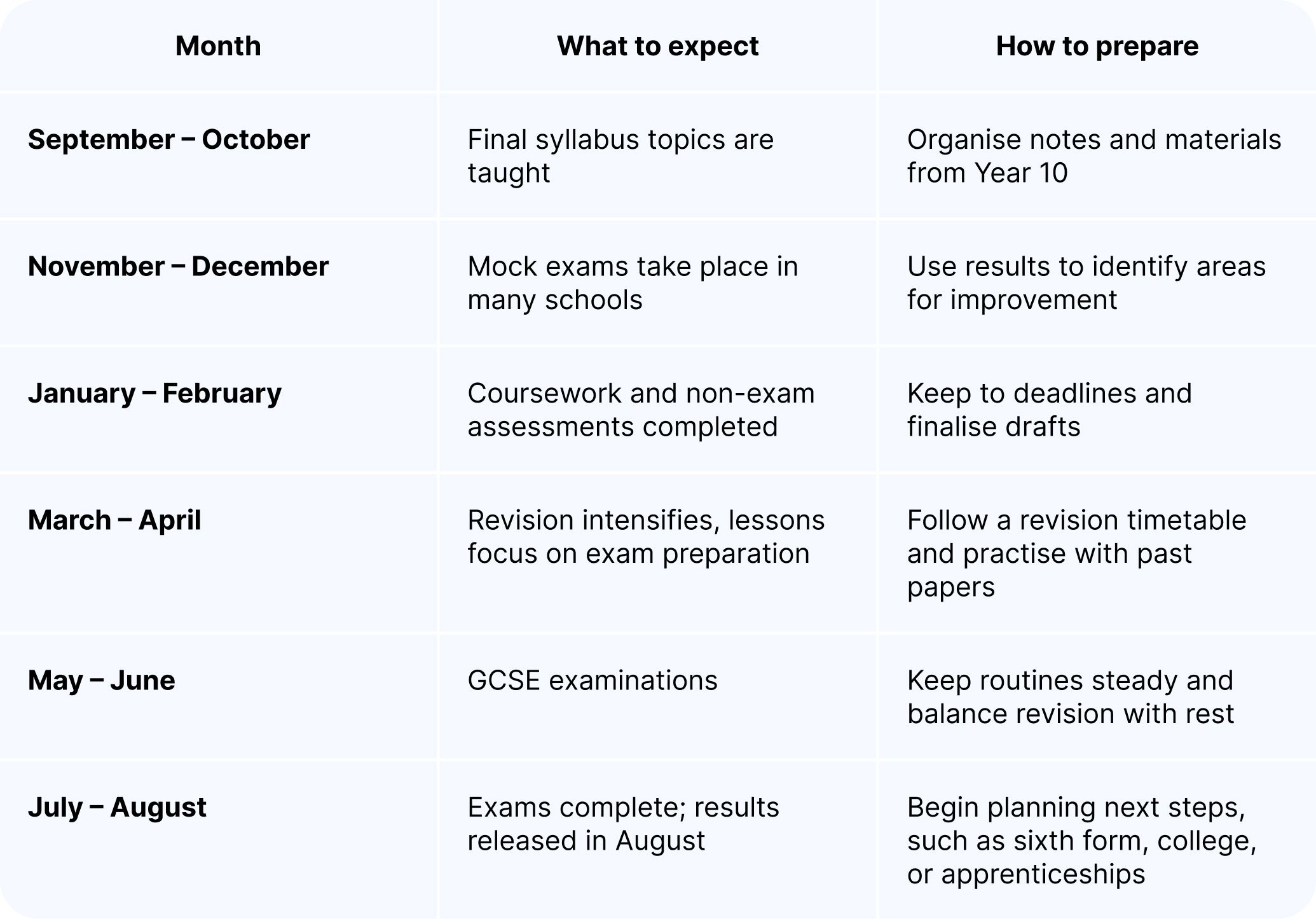What to expect in the GCSE year: tips for Year 11 students
By Atom | Oct 7, 2025, 4:32 PM
Contents
The GCSE year is often considered the busiest and most important secondary school stage. With exams ahead, coursework to complete, and important decisions about the future, Year 11 can feel daunting. Yet with the right approach, it is also a year of progress, independence, and achievement. Support from parents and teachers and effective study habits help students confidently approach exams.
This blog covers:
How the GCSE year is structured
Effective revision and exam preparation strategies
Key milestones across Year 11
Options available after GCSEs
Understanding the GCSE year
Year 11 brings together the final stages of learning with focused exam preparation.
Most schools follow a familiar structure:
Autumn term: Teachers complete the final parts of the syllabus. Mock exams often occur between November and January, giving students a first chance to practise under exam conditions.
Spring term: Teachers review the main topics to ensure knowledge is secure. Coursework or non-exam assessments, such as in English or the Arts, are usually finalised.
Summer term: GCSE examinations are held from May to June. This rhythm provides a framework for planning revision and ensuring steady progress throughout the year.
This timeline will help families and students feel prepared for each stage of the year.

Practical revision strategies
In Year 11, now is the time when revision needs to ramp up, and students' time should be committed to prioritising planning and revising for GCSEs.
Revision is most effective when active, varied, and carefully planned. Strategies that make a real difference include:
A structured timetable - scheduling revision by subject and topic - ensures steady syllabus coverage.
Active recall - testing knowledge, rather than re-reading notes, strengthens memory.
Past papers and mark schemes - practising under timed conditions builds exam confidence and highlights areas for improvement.
Subject-specific approaches
English: practising essay plans and using structured techniques such as point, evidence, explanation and link (the PEEL technique).
Mathematics: solving a wide range of problems, with repeated practice of core methods.
Science: creating diagrams and flowcharts to explain processes.
Humanities: using timelines and case studies to strengthen understanding of key events and ideas.
Mixing methods keeps revision engaging and builds a deeper understanding.
Managing exams and mocks
Mock exams are an important part of the GCSE year. They usually occur once or twice in Year 11, often in late autumn (November or December) and sometimes again in spring (February or March).
Schools use them to give students a realistic experience of sitting exams under timed conditions.
Why mocks matter
They show which topics students clearly understand and which need more revision.
They give teachers a clear picture of progress and where extra support might be needed.
They help students get used to the practical side of exams, such as working to time limits, managing nerves, and following exam instructions.
For many schools, mock exam results are also used to predict final grades or plan extra support in the months before the real exams.
How to prepare for mocks
Treat them like the real thing – using practice papers and practising under timed conditions helps build familiarity.
Use revision timetables – plan study sessions in the weeks before mocks to cover all subjects fairly.
Review mistakes afterwards – the most valuable part of mocks is the feedback. Going through where marks were lost shows exactly what to focus on for improvement.
Keep perspective – while important, mocks are also a learning opportunity. They are designed to highlight areas for progress, not to define final results.
When the final exams arrive, mocks help students feel more prepared and less anxious, because the process already feels familiar.
How to prepare for the final examinations
Arrive prepared – bring the right equipment (pens, calculator, rulers) to avoid last-minute stress.
Read each question carefully – take a moment to understand each question before writing.
Plan time – note how long is available for each section and stick to it.
Prioritise your time effectively – if one question seems difficult, move on and return later.
Keep perspective – one tricky paper does not decide the overall grade; success comes from performance across all exams.
Looking ahead: life after GCSEs
Finishing GCSEs is not just about ending exams; it marks the start of an exciting new stage. Results open doors to different pathways, each offering unique opportunities for growth and exploration.
Sixth form – Many students choose A levels, which open a wide range of options for university or careers later on. Success at GCSE helps secure places on the most popular courses.
Further education colleges offer academic and vocational routes, from BTECs to specialist training. A strong set of GCSE results gives students more flexibility in course choice.
Apprenticeships – For those ready to gain hands-on experience, apprenticeships combine real work with study, earning qualifications along the way. Many require certain GCSE grades, particularly in English and Mathematics.
Doing well in GCSEs keeps more doors open. Strong results make it easier to choose the right path, whether aiming for university, creative industries, science, business, or skilled trades. Year 11 is therefore not only about exams, it’s about building a foundation for future opportunities, independence, and exciting next steps.
Final thoughts
The GCSE year can feel demanding, but it is also a chance for students to grow in independence and resilience. With steady revision, healthy routines, and support from family and teachers, Year 11 becomes not just a year of exams but a year of achievement. GCSEs are an important milestone, but they are also the gateway to many exciting opportunities ahead.
Don’t miss Atom’s GCSE giveaway!

Six months. Six epic prizes. Six chances to make the GCSE season unforgettable.
We’re launching Atom for GCSE prep in 2026, and to celebrate, over the next six months, we’re giving away thousands of pounds worth of prizes to help your child level up their GCSE revision.
Here’s a taste of what’s up for grabs:
The latest Apple tech, including an iPad Air, Vision Pro and more
Festival tickets for Boardmasters and Reading 2026
Europe interrail passes and £1,000 spending money
…and that’s just a few of the amazing prizes available.
Our first two winners have already taken home incredible prizes! Find out who they are and what they won in our latest giveaway update and keep an eye out for news of our November winner.
It’s free to join. UK only. Full T&Cs apply.
Contents
